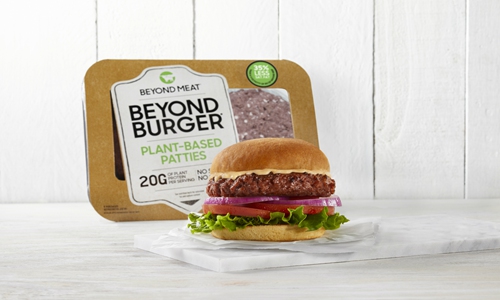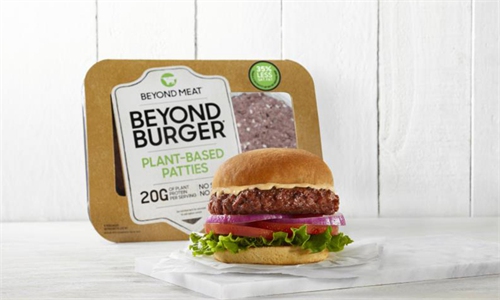SOURCE / INDUSTRIES
Plant-based products ‘meat’ consumer demand amid health concerns

Beyond Burger made from plant-based ingredients without soy or gluten Photo: Courtesy of Beyond Meat
International alternative meat brands are racing to feed the appetites of Chinese consumers, with two US-based food industry giants, Beyond Meat and Cargill, announcing new moves to push into the online and physical markets this week, as customers might be more open to plant-based meat amid rising concerns over meat safety and COVID-19.
US industry bellwether Beyond Meat announced its retail debut in cooperation with Alibaba on Tuesday. Its signature Beyond Burgers will be available in 50 Freshippo stores under Alibaba in Shanghai from this weekend.
The company also plans to bring Beyond Burgers to Beijing and Hangzhou, East China's Zhejiang Province in September, in 48 Freshippo stores and the company's online app.
Its partnership with Alibaba is Beyond Meat's latest move to take on the Chinese market. The meat alternative company cooperated with KFC China, owned by Yum China Holdings, to test its plant-based chicken nuggets in April. It also worked with Starbucks to introduce a plant-based menu in China in the same month.
Beyond Meat is not short of competitors. Another US-based company - Cargill - on Tuesday said it will introduce its alternative meat brand PlantEver to China. There are already two plant-based products under the brand, including chicken alternative nuggets that are already on the market and a beef alternative patty to be introduced this month.
The company will also introduce two additional co-branded products with convenience store chain Lawson, including a plant-based scallop alternative and chicken-alternative tenders, according to a statement sent to the Global Times on Wednesday.
International brands have accelerated their push into China since April, probably driven by increasing concerns over meat products since the outbreak of the COVID-19, Zhu Danpeng, a food industry expert told the Global Times.
"Chinese customers are more inclined to choose real meat products over synthetic ones, in terms of their habits," Zhu said. "But since the coronavirus outbreak there's mounting concerns over the safety of meat and whether some animal products are associated with the virus.
"Plant-based companies see it as a chance to promote their alternative products," Zhu said.
In the recent COVID-19 flare-ups in Beijing, the coronavirus was detected on a chopping board used for imported salmon, causing wide concerns over imported seafood. The imported salmon products were later taken off supermarket shelves in Beijing.
The retail sector is a key part of the brand's development in China, Ethan Brown, founder and chief executive of Beyond Meat, said in a statement sent to the Global Times. Through cooperation with Alibaba he expects to take on the market by introducing its products "to home cooks throughout China."



